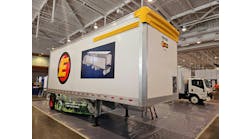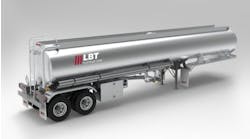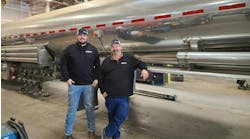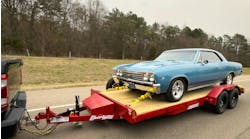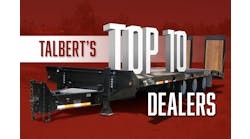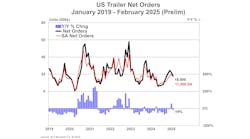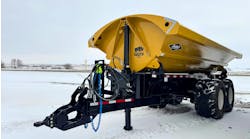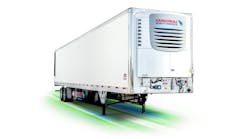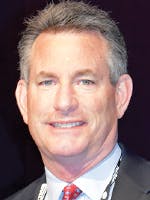Fourteen TTMA associate members delivered news about their companies’ trailer-related products and services during the TTMA convention.
This year’s convention had two such sessions on the program during which each of the participants had four minutes to explain their product and its benefits.
Here are the 14 who offered an update:
P.S.I. acquires TPMS product line
Pressure Systems International has continued its strategic growth plans following last year’s announcement of its investment in PlasmaStream. P.S.I. has completed the acquisition of Truck System Technologies (TST), a provider of tire pressure monitoring (TPMS) and mobile asset management systems (MAMS) technology.
The addition of this product line provides P.S.I. with a full range of tire pressure management products for tractors and trailers. Jim Sharkey, senior director of global sales and marketing, said prior testing by P.S.I. of the TPMS and asset tracking products “has proven the products to be very robust, holding up well in even the extremes of the trucking market.”
He said the timing is well-suited, given the pending Greenhouse Gas Phase 2 rules for trucks and trailers. Under GHG 2, there will be increasing demands for reduction of emissions, and TPMS is viewed as a primary solution for the tire management of trucks and tractors.
The new product line includes telematics and tracking products that will provide fleet management teams the ability to locate assets and track various inputs of their choosing. The benefits include real-time tracking of assets, with monitoring and reporting of inputs in a single package, with simple connectivity. Examples of the monitoring include the ability for real-time tracking of individual tire pressures and temperatures with the added functionality of setting user-specified alerts.
He said TST already has a solid reputation in the RV market that it will build on as it expands into the commercial vehicle segment. While the products for each market are similar, they have been engineered to meet the unique demands of their markets. P.S.I. will be keeping the TST brand exclusively for the RV market, while it focuses on a complete launch of a commercial vehicle offering under the P.S.I. brand.
Pressure Systems International markets and sells its automatic tire inflation product in North America through Meritor as the Meritor Tire Inflation System by PSI. PSI has sold over 1.4 million systems on a global basis through markets in 45 countries and is currently exporting to China, Europe, South America, Africa, and Australia.
Steel of West Virginia opens new plant
Steel of West Virginia Inc has invested in a new $16 million galvanizing plant that is being built and will be run by an affiliated company, Steel Ventures Inc.
President/CEO Tim Duke said this plant is a state-of-the-art green field facility with all the latest safety and environmental features, and is located in Wurtland, Kentucky, 30 miles west of Steel of West Virginia’s Huntington, West Virginia, facility.
At the time of the TTMA conference, the construction of this new galvanizing plant was nearing completion and galvanized product was projected to be available to be shipped early in the third quarter.
The plant has a tank that is 43’ long x 12’ wide deep x 6’ deep wide and will therefore be able to coat a wide variety of products, including truck trailer crossmembers, I-beams, posts, complex fabricated assemblies, and other miscellaneous parts. Having this dedicated facility will improve lead times and minimize transportation costs for truck trailer manufacturers.
Steel of West Virginia has invested over $72 million in capital improvement projects since its last TTMA associates presentation several years ago. These improvements are in every area of manufacturing operations, from the melt shop, through rolling, fabricating, and coating, all of which increase the capacity available for truck trailer crossmembers and the quality of those crossmembers.
Highlights of the melt shop improvements, totaling $13.9 million, include a major furnace upgrade, new robotic temperature and oxygen probes, a new magnetic slide gate system to control the flow of hot metal, new caster oscillators, and a new caster straightener. In the rolling mill, upgrades totaling $26.3 million include a new laser profile measuring gauge, a bar-weighing system, new rolling mill housings, a descaling system, rolling lathes, a new dual stacker system, a yield optimizer shear, and a new state-of-the art rolling mill control system. The new profile gauge should be of particular interest to trailer manufacturers because it gives the operators continuous feedback on 12 different product dimensions, which improves the accuracy and reduces the variation in these dimensions.
New fabricating equipment, totaling $16 million, includes new band saws at SWVA Inc in Huntington and at Marshall Steel Inc in Memphis. These new band saws increase capacity and ensure the capability of cutting precision lengths. The latest generation of robot welders for welding end clips to beams have been purchased and installed at both SWVA Inc and Marshall Steel. This brings the total number of robot weld lines at SWVA to four and gives Marshall a new robot welder in addition to their eleven manual weld stations. These new robot weld lines have improved material handling and improved clip placement control. The wax line at SWVA, the largest in North America, is being refitted with a new material handling system that will increase capacity for waxed products and minimize handling damage.
Alcoa’s wheels get even lighter
Randall Scheps, vice president/GM of the Americas for Alcoa, said Ultra ONE Wheels with MagnaForce alloy remain the lightest commercial vehicle wheels, and are now even lighter.
They are engineered with proprietary MagnaForce alloy, which is 17% stronger.
“The size that started it all is the 22.5”x8.25” wheel—40 pounds,” he said. “With each wheel weighing five pounds lighter, you save nearly another 100 pounds per rig. It is now joined by the 24.5”x8.25”. It weighs just 51 pounds. The 22.5”x14” wide base wheels come in at just 52 pounds—another two pounds lighter, while maintaining a 12,800-pound load rating. They are available in 0, 1, and 2 inch outsets. The 22.5”x9” wheels, at just 48 or 56 pounds, depending on the fitment, each performs at a load rating of 10,000 pounds, making these the lightest wheels in the industry. That means you can haul more every time you hit the road. And that’s a nice lift to your bottom line.”
He also introduced the new Alcoa Dura-Bright EVO wheel.
“With a new, no-polish surface treatment, Dura-Bright EVO wheels let you wash less and drive more,” he said. “They stand strong against the toughest road conditions and caustic cleaning chemicals, so wash after wash, mile after mile, your wheels remain bright and shiny. In fact, Alcoa Dura-Bright wheels stay cleaner, longer. They only require a simple soap and water wash; then you’re back on the road. More durable than ever before, new Alcoa Dura-Bright EVO wheels allow your truck to look great for the long run. Alcoa Dura-Bright EVO wheels make sure that what happens on the road, stays on the road.”
He said Alcoa split into two separate companies last November—Alcoa and Arconic—but there is no change to the wheels: “They will always be branded Alcoa.”
MMA offers insurance program
John Kerr, founder of the Trailer Manufacturing Practice Group for Marsh & McLennan Agency, an insurance agency with 70,000 employees, introduced
MMA’s Trailer Manufacturers’ Insurance Program.
He said MMA went to the trailer industry and asked, “What kind of services can we put together that are going to better support you?”
This resulted in the development of an accident investigation team.
“If the accident caused some bodily damage to someone, we investigate the trailer and we do this to determine and help establish the amount of human or operator error involved,” he said. “I’d say 98% or 99% of the time, the fault is not in the manufacturer’s product but in the operators. It’s absolutely critical that we determine that cause. We have to communicate with the insurance agency on what the true cause of what the loss was. If we do not do this, if you or your agency doesn’t do that for you, making the case for the underwriter, you’ll end up paying for it in higher premiums or a volatile relationship with your carrier.”
MMA also performs an owner’s manual review.
“When we bring on a new client, we take your owner’s manuals and do an audit,” he said. “We have a legal firm we deal with that handles trailer manufacturers and a lot of transportation defense. This is important because your owner’s manual is often your first line of defense. It is a critical defense document. Having a defense strategy of ‘you should have known that’ or ‘you should have known better’ has not played out particularly well for most. So we want a robust owner’s manual that defines very clearly what the obligations of the operator are. Workers’ compensation is what most of our trailer manufacturers’ biggest spend is. We have to have a solution for workers’ compensation. So we go out and inspect your facilities, do a thorough audit of your safety practices you have in place. The program we use is employed by those who are looking to become self-insured. They want to assume more of this risk. So we look at the best practices there. After we survey your facilities and your practices, we develop one- and three-year programs so we can proactively and very directly attack the issue and help you manage the cost. It’s important for protection of your employees but also as a potential savings for your insurance program.”
Wabco offers aero products
Savvas Constantinides, regional marketing leader for North America, said Wabco has been a 30-year innovator in aerodynamics with its patented mono-clamp and AutoTail.
“More than 50% of engine-generated energy is lost due to aerodynamic drag,” he said. “The faster a vehicle drives, the higher the aerodynamic forces affecting fuel economy. Our portfolio address four problem zones: tractor cab: roof deflectors, side fenders; gap area: nose fairing; trailer underside: skirts; and back of the trailer: tails.
“GHG 2 has been a challenge for trailer builders. Trailer builders have to certify and decrease their total CO2 grams/ton-mile emissions.
“We have aerodynamic in-house knowledge to customize your aero trailer solution: CFD, wind tunnel, track. We deliver automotive quality by using our own lifetime, winter and durability standards and facilities.”
Two new products for Aero Industries
CEO James Tuerk of Aero Industries, which is celebrating its 73rd year of existence, presented a historical perspective of its tarping systems and trailer accessories. New in 2017 are the AeroForce Tarping Systems and AeroDynamic product introductions.
At the heart of the AeroForce products is a new pivot and spring technology that improves front-to-back, side-to-side and roll-off container performance and durability. The early focus of the AeroDynamic products is the AeroTail van trailer rear device that features a low-profile design with 4% fuel savings and hands-free operation.
He said Aero Industries is one of the nation’s leading providers of innovative accessories for the transportation industry. Headquartered in Indianapolis, Indiana, it serves its customers through satellite locations in Nebraska, Ohio, and a nationwide network of dealers. Products include a wide range of innovative tarp systems and accessories for dump and flatbed trailers.
Aero was founded in Indianapolis in 1944 by Paul Tuerk as Aero Canvas Products. Initially a manufacturer of tarps, the company soon expanded its product line and achieved a reputation as a leader in development of accessories for the transportation industry. Aero’s history as a leader in the industry spans from introducing the first aluminum stake side kit to rolling out the first sliding tarp system, the Conestoga, in 1984.
In December 2004, the Indianapolis headquarters moved into a new state-of-the-art manufacturing facility with over 140,000 square feet of space. Additional locations are operated in Omaha and Valley, Nebraska; and Kent, Ohio.
In 2016, Aero Industries moved into its new facility in Kent, Ohio, which replaces the original Streetsboro site. It is located off of I-76 and provides a state-of-the-art facility for the installation and servicing of Aero products, in addition to offering a more accessible location for customers.
New aluminum wheel from Maxion
Maxion Wheels, the largest global producer of wheels, has introduced a new commercial vehicle forged aluminum wheel product line and launched the industry’s first commercial vehicle standard finish warranty.
Bill Wardel, VP of global sales and marketing, said that with the addition of forged aluminum wheels to its extensive selection of steel wheels, Maxion offers the world’s broadest range of truck, trailer, and bus wheels.
“Because providing fleets with a one-stop source for both aluminum and steel wheels means we provide fleets with the maximum value,” he said.
At 34% lighter than Maxion’s comparable steel commercial vehicle wheel, the new aluminum commercial wheels offer an alternative solution for addressing the market need to reduce fuel consumption and greenhouse gas emissions.
Maxion Wheels’ hub-piloted forged aluminum commercial vehicle wheels are first being offered in the 22.5” x 8.25” size, with additional sizes to follow.
He said that because vehicle appearance is important, the new aluminum wheel will offer three premium finishes as well.
Maxion also has introduced the first five-year standard warranty for MaxCoat Extra multi-layer finish.
MaxCoat Extra has a layer of advanced zinc-phosphate undercoating, a state-of-the-art epoxy primer, and a premium topcoat to provide superior edge protection, exceptional durability, UV/fade resistance and longer wheel life. It all adds up to a lower total cost of ownership for fleets.
“Maxion Wheels’ innovation and market leadership will continue, as it has for over 100 years,” he said. “It’s how we have grown to be the world’s largest wheel manufacturer, with more resources and capabilities than anyone else.”
Accuride expanding capacity, technology
Over the past five years, Accuride has invested over $200 million dollars across its business to selectively upgrade and expand capacity and to develop and introduce industry leading wheel and wheel-end technology for the heavy-duty truck and trailer industry.
An important part of this investment has been Accuride’s implementation of common lean manufacturing and quality systems across all of its manufacturing and distribution facilities.
“This has resulted in consistent, world-class levels of operating performance with flawless delivery and quality,” said Rick Dauch, president and CEO. “Field warranty data validates single-digit P-P-M performance, not only on high-volume part numbers, but across all products.”
He said Accuride has earned four Association of Manufacturing Excellence Awards in three years—the only manufacturing company in the world to reach such a plateau.
Renewed focus on research and development has enabled Accuride to achieve industry-leading performance in light-weighting and coating technologies.
“Steel Armor, a premium powder coating, eliminates any need for refurbishing in its first five years,” he said. “And even more advanced, the EverSteel coating system extends corrosion protection out to eight to 10 years before refinishing may be required.”
Accu-Lite steel wheels are now three pounds lighter, and the five-hand-hole version is North America’s first 65-pound steel wheel.
Quantum 99 is Accuride’s all-new proprietary aluminum alloy and enabled the company to introduce a true 40-pound aluminum wheel. Twenty percent stronger than the previous alloy, Quantum 99 achieves twice the fatigue life of the competing 40-pound wheel—a real strength and durability advantage for fleets.
Accuride acquired the metal matrix composite (MMC) technology assets from Century-3 Plus LLC in 2015 as part of its commitment to develop lightweight Gunite wheel end components capable of delivering substantial weight, fuel and operating cost savings. The initial development program—creating high-performance, lightweight Gunite-brand brake drums—is an integral part of Accuride’s component lightweighting initiatives to help the commercial vehicle industry comply with upcoming GHG Phase 2 regulations.
Accuride’s MMC technology combines highly engineered cast aluminum with a selectively reinforced MMC wear surface to form a durable and resilient yet lightweight patent protected brake drum. The drum is well-suited to a range of commercial vehicle, off-highway, and military applications where weight savings is paramount, yet without sacrificing performance or durability.
At approximately 61 pounds, the patent-protected MMC aluminum brake drum Accuride is developing is capable of delivering significant weight reduction—as much as 100 pounds per axle over standard cast drums. That represents an approximately 300-pound savings for a typical three-axle Class 8 tractor. The lightweight MMC brake drum also has demonstrated more rapid heat dissipation, improved braking performance and a longer lifespan than traditional cast drums.
Gunite expects to complete testing this year and anticipates bringing this new technology to the market in 2018.
KIC unveils ROLLiant hub system
KIC president/CEO John Schneider said his company has introduced ROLLiant to address the issue of wheel bearing adjustment, a critical factor in the life and safety of North America’s trucking fleets.
He said a deviation in adjustment of less than the width of a human hair can mean the difference between a safe reliable vehicle and premature tire wear, wheel seal failure, or even bearing failure.
Before ROLLiant, manufacturers who wanted long life or low maintenance hubs had to turn to special spindle nuts, requiring extensive adjustment time and training, or spacer-set systems that require more expensive bearings and alloy steel spacers. With multiple manufacturers involved, responsibility for warranty claims became less clear.
With ROLLiant, KIC is offering a single hub system that costs about the same as a standard wheel end, is quick and simple to install. It has a 10-year warranty. The warranty covers the hub, the bearings, and the seal. In the event of a field issue, KIC will send a new factory certified hub.
The key to the ROLLiant hub system is the extended bearing cone. For parallel spindle hubs, KIC has extended both bearing cone races to meet in the middle of the hub. Extending the bearing race eliminates the need for a separate bearing spacer. This also means that KIC has cut the number of tolerance interfaces from two to one.
One of the benefits of fewer bearing contact points is that KIC also has gotten rid of expensive “half-stand” bearings.
For tapered spindles, KIC has extended the race on the inboard bearing to meet the outboard bearing. The result is that a standard outboard bearing can be used, further simplifying the system. ROLLiant is also available in FF steer spindle and R spindle drive configurations.
But it’s not just the bearings that are new.
At the KIC facility in Naperville, Illinios, each ROLLiant hub is inspected with a custom press line that applies a simulated torque load and tests the endplay of each hub. Then the special 10-year wheel seal is pressed directly into the hub, which reduces the potential for misalignment of spindle-mounted seals.
After guaranteeing the end play of each ROLLiant hub kit, KIC serialized it and encased in a patent-pending hub packaging system. This packaging ensures that each ROLLiant hub is delivered free of contamination—and it’ll stay that way right up until installation.
Installation of the ROLLiant hub couldn’t be simpler. Just remove the inboard seal cover and apply a thin film of hub lubricant to the seal inner diameter. Then mount the hub on the spindle, and install the approved spindle nut of your choice. Torque the spindle nut to 300 foot pounds, and that’s it.
Because each ROLLiant hub is 100% inspected, bearing endplay is guaranteed to be between 2/1000 and 5/1000 of an inch at 300 ft-lb.
In fact, you can install four ROLLiant wheel ends in the time it takes to install one standard manually adjusted wheel hub.
The ROLLiant was designed with three things in mind: to save the trailer OEM on installation and assembly; to help that manufacturer differentiate its product and capture market share; and to give the end-user the peace of mind knowing they have a hub that will last the life of their trailer.
ROLLiant joins KIC’s list of new products, such as the Trident Composite Lightweight brake drum and KIC’s new patent-pending dual connection rotor design.
Dow’s technologies lowering food waste
Robert York, strategic marketing manager for the Dow Chemical Company, said the world’s population is expected to grow from seven billion people in 2010 to more than nine billion by 2050. That will require a 70% increase in global food production.
Today, refrigerated transportation alone could cut food waste in developing countries by 25%. That amounts to 1.3 billion tons of food each year.
He said that to help lower food waste and energy consumption, technologies from Dow are already playing a role to transport food more efficiently from farm to table.
Some of Dow’s products innovated for the truck and trailer industry:
• BETAMATE structural adhesives used in plywood flooring for trailer bodies enables the floor to be bonded directly to the trailer body, eliminating the need for mechanical fasteners such as screws during installation.
• BETAFORCE and BETAMATE structural adhesives for the replacement of mechanical fasteners enable significant weight reduction, enhances product longevity, improved acoustic performance and better corrosion protection.
• BETAFILL adhesives and seam sealers provide permanent elasticity and good adhesion properties for a variety of substrates while providing acoustical and thermal management advantages.
• BETASEAL elastic adhesives for roof bonding and mixed material joining enhance structural integrity and reduces contact corrosion.
• To be cost efficient, refrigerated trucks require lightweight insulation that’s durable enough to stand up to heavy use. Seal and insulate around joints, penetrations, and hard to reach corners with FROTH-PAK insulation and sealants to reduce air and moisture penetration.
• Using VORACOR polyurethane insulation on the walls, ceiling, and flooring of a refrigerated vehicle helps keeps contents stored at the optimal temperature and helps to keep fuel costs down by helping light-weight the body of the truck.
This technology is in development to meet EPA standards and reduce low global warming potential by 99.9% while sustaining the energy efficiency and durability benefits Dow provides today
Besides transportation, Dow is stepping up with innovations for every stage of the food supply chain.
Its biotechnology is increasing crop yield, quality, and variety.
During the food production process, special ingredients are being developed to make products free of gluten, eggs, and meat—addressing the needs of millions of people with Celiac disease, food allergies, and other dietary restrictions.
Dow’s barrier films also help extend food freshness, reducing product loss during transport, on the store shelves, and in the home.
Sunrise debuts improved wheel design
Michael Edwards said Sunrise International was founded in 1995 in Xiamen, China. In 2008, it set up the first overseas factory in Vietnam, becoming a public company in China in 2011 and a branch company in the US in 2012.
He said North American sales of wheels are 38% OE and 62% aftermarket.
He said Sunrise has an improved design with a different heat flow direction that improves cooling performance. High-tensile steel 590 provides higher strength and better heat dissipation. PPG and Valspar effectively assure coating performance. An optimized rim design enhances loading capacity, and a wider and higher rim design protects tire bead.
SAF-Holland unveils two suspensions
What if as your suspension got lighter, it also got tougher? What if as your bearings rolled smoother, they also lasted longer? What if as your brakes performed more efficiently, they also required less maintenance?
Jeff Talaga, VP of sales and strategic development, said the all-new CBX AeroBeam series from SAF-Holland is “everything we’ve ever learned poured into one highly efficient suspension system. Our engineers have upgraded our fleet-proven CBX series suspensions to be lighter, tougher, more versatile, and more maintenance-free than any that have come before.”
“The CBX-40 AeroBeam slider suspension has shaved 85 pounds off our previous CBX-40, now weighing in at 27 pounds less than our nearest competitor. SAF has increased the strength and toughness of the CBX-40 AeroBeam by adding 16 strategically placed reinforcements that improve resistance to damage caused by curb strikes, slider reposition, and drag turns. The shocks have been conveniently relocated into the middle of suspension beam, leaving additional room for the installation of air tanks, brake valves, tire inflation equipment, and AVS modules. The CBX-40 AeroBeam is the lightest weight, most durable sliding suspension available and is backed with the industry’s longest warranty.”
And now, for weight-sensitive tanker and flatbed trailer applications, SAF-Holland is announcing the CBX-23 AeroBeam fixed frame air suspension. Talaga said it is “now the lightest air suspension in the industry, 45 pounds lighter than our previous model and 25 pounds lighter than the nearest competitor.” Standard features include heat-treated cast alloy suspension beams and 80 KSI frame brackets. The AeroBeam can be adapted to a wide range of trailer chassis with multiple frame bracket styles, including weld-on taper top, weld-on with weight, and bolt-on.
Both the CBX-40 and CBX-23 AeroBeam suspensions feature SAF-Holland innovations like Auto Posi-Lift axle lift technology. With Auto Posi-Lift, sensors determine whether to automatically raise or lower the front axle, based on the load in the trailer. Auto Posi-Lift helps save fuel, saves brake, tire, and axle wear, and improves fleet performance.
Cush offers custom suspensions
Tony Cox, director of sales, said the Cush Corp is a designer, manufacturer, and seller of suspensions for the tractor trailer industry and has been in business since 2000.
“You may or may not be familiar with us or know that much about us,” he said. “Most of our customers today came to us because they had a unique need or wanted a custom solution, or they were disappointed or frustrated with their suspension model or just wanted to see what else was available to them, and they ended up liking what they saw.
“So I probably haven’t met everyone in this room but I sure would like to. Track me down if there is any reason to have a conversation.”
New composite floor from Rockland
Chris Wolford, executive VP, introduced the Defender composite floor.
The Defender is a version of the Pound Saver composite floor, which uses a fiberglass-reinforced polyethylene terephthalate glycol (PETG) underlayment rather than conventional thermosetting FRP. This technology is made of 60% fiberglass, forming a strong and impermeable protective barrier for the floor’s underside.
The Defender is bonded to the bottom of an oak floor utilizing the same patented bonding technology found in the Pound Saver composite floor.
The Defender is designed for customers seeking composite floor performance and protection at a fraction of the cost.
The benefits:
• Superior protection. The Defender protects from water, salt, and other contaminants that can damage the wood and glue line of a laminated floor.
• Stronger. The 1-3/8” Defender is 44% stronger than a regular oak floor in the same thickness.
• Higher load rating. A 1 3/8” Defender floor can achieve a 24,000-pound load rating at roughly half the cost of a Pound Saver composite floor.
• Lower maintenance costs. By sealing off the glue line and wood from the elements, routine maintenance on the underside of the floor is eliminated.
• Longer working life. Floors armed with the Defender are both protected and reinforced resulting in longer working life.
Pound Saver composite floors are engineered to haul more, weigh less, and last longer thanks to a patented design.
Pound Saver consists of an FRP layer bonded to the bottom of a Rockland laminated oak floor. Pound Saver is for any fleet looking for higher payload, superior bottom protection, and weight savings.
• Stronger. The Pound Saver is stronger than standard oak flooring thanks to reinforcing fibers that are incorporated into the floor design.
• More durable. Pound Saver floors increase working life by reducing floor fatigue that can occur after years of service.
• Maintenance friendly. Pound Saver’s proprietary membrane shields the underside of the floor from water, salt, and gravel that can lead to costly floor repairs.
• Lighter than standard oak. Pound Saver floors can save up to 323 pounds over standard oak flooring based on the configuration.
• Built for your bottom line. The Pound Saver will increase fuel economy and payload while reducing floor maintenance. ♦
